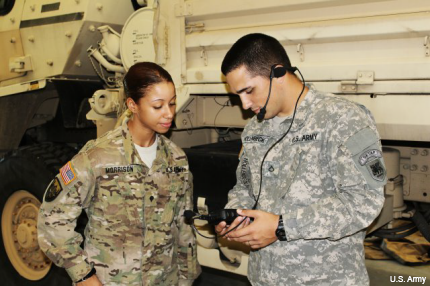Army developing nine-language voice translator
The Army wants to equip deployed soldiers with a two-way translation device, starting with a focus on French dialects in Africa.

Soldiers test the SQ.410 Translation System in July in Vicenza, Italy.
The SQ.410 Translation System made by VoxTec is currently programmed with nine languages and does not require a cell network or an Internet connection the Army said in a release. The device, which is designed to be worn on the chest for hands-free operation, will repeat a soldier’s spoken words in English and display them on the screen, so the soldier can be sure the voice recognition is accurate. The system then provides written and spoken translations in the other language, the Army said. It also can be used to record conversations.
The SQ.410 was tested in mid-July in Italy at the U.S. Army Garrison Vicenza and received positive marks from those involved, the Army said.
The Army officials are heavily investing in Africa, a land with rich natural resources, several U.S. partners and a variety of languages. Working effectively with African partners given the continent’s importance is critical for the future of interoperability, especially as threats from insurgent groups in Somalia, Nigeria, the Sahel and the Maghreb persist. The Army conducts training in about 20 of the continent’s 54 countries.
“We believe Africa is a future frontier for technology in the next 10 to 15 years,” said Maj. Eddie Strimel, the Field Assistance in Science and Technology, or FAST, advisor assigned to U.S. Army Africa, noting that communicating in French dialects—which are common and varied in Africa—is becoming critical. “French is a priority for us. If we can get these dialects developed with this type of system, it will benefit the Army, Air Force and Marines down the road.”
Researchers are working on improvements, particularly with regard to the various dialects. Speech translation software for French generally deals with standard European speech. "How well it works for communication tasks specific to U.S. teams working with African partners is just now being examined,” said Dr. Stephen LaRocca, a computer scientist and team chief of the Multilingual Computing Branch at the Army Research Laboratory, who provided technical expertise during testing.
"From a scientific perspective, we need to know how sensitive the technology is to the different accents of the many diverse French-speaking African language communities," LaRocca said.
Additionally, the system is not yet capable of translating military jargon, though this is currently just a minor issue as the system provides critical communications capabilities with partners in the absence of translators.
The Army’s Africa component is working with the Army Rapid Equipping Force to purchase five translators to continue testing and data collection to refine the software. And the Army doesn’t expect to stop with Africa, as commanders around the world have expressed interest in the translators.




